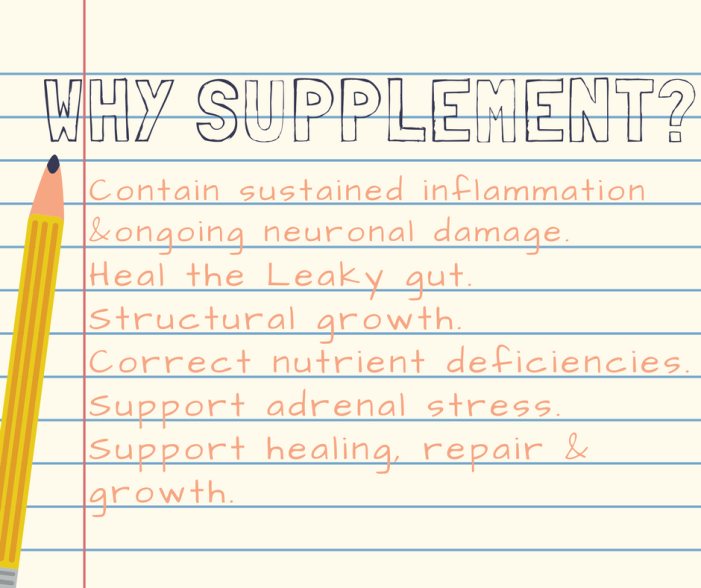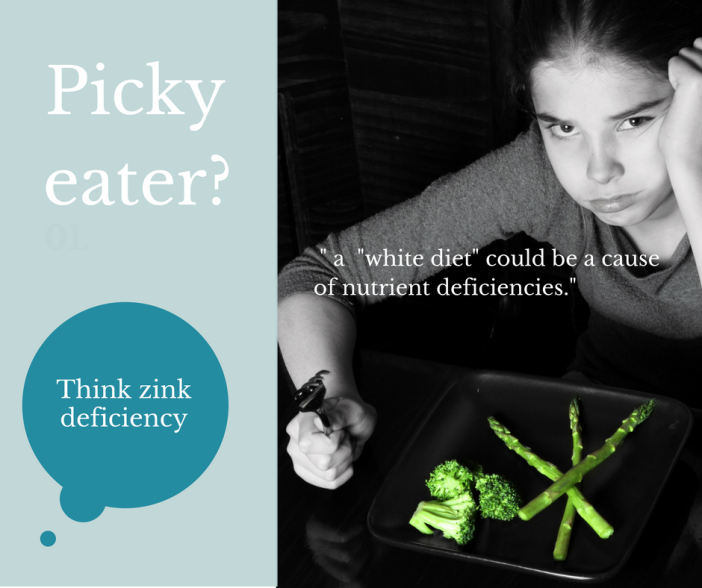
Kids with Cerebral Palsy often struggle to eat and absorb all the nutrients in their food, so supplementing with vitamins and nutrients can be a good idea – if carefully managed
I have purposefully kept this post to the last in my nutrition series because I feel that when you get the diet right, you do not need to worry about a long list of supplements. However, it is also true that we (able and non-able-bodied people) are not getting enough vitamins and minerals from commercially produced foods and, try as one might, eating completely organic and fresh is not always practical.
Why supplement?
The immunological damage that takes place after a brain injury can last for years. There have been several studies that describe the ongoing pro-inflammatory responses in kids with CP. As I have mentioned before, these responses have far-reaching effects that may include further neuronal damage (through glial activation and excitotoxicity), leaky gut, auto-immunity and, of course, the ongoing deterioration of the connective tissue network where we see joint and structural deteriorations. In addition, there have been a few interesting articles looking at stress in kids with CP. Being disabled is an extremely stressful situation and I have observed how Emma battled with this in her own young life. Stress leads to sustained demands on the adrenal glands to produce high levels of stress hormones. These increased demands on the body naturally requires increased need for co-factors (vitamins, nutrients, minerals etc.). This is where specific supplementation becomes relevant.

What supplements can you give?
I don’t believe in giving kids a long list of supplements, rather, I feel each child is unique – especially those with CP –and requires a bespoke approach. Therefore, I suggest that one works with a functional or integrative doctor or nutritionist to get this balance right for each child.
Emma’s supplements have changed both as her needs have changed and I have learned more. The start of my supplement journey began with a very good book by Kelly Dorfman: “Curing your child with food”. This was hugely informative, however, as Emma has so many different problems, if I were to apply everything in such a book to her, she would have to swallow a lot of supplements every day.
Working in clinical practice, I realise that taking lots of supplements is just not feasible even for able-bodied adults, let alone kids who cannot swallow. So the key is to keep it as simple as possible.
Where to start
The trick is first to get the right nutrition in place (I know, you hear this from me a lot, but see all my previous nutrition blogs for reasons why) and then to use a base set of supplements that works for most things. This way you can reduce both the cost and the effort.
When considering supplements, it’s important to buy products that are food based. Yes, I was surprised too. There are actually vitamins out there that are manufactured from petroleum by-products! These are not what you want to give your child. For more info: http://www.doctorsresearch.com/articles4.html
If you want to find out more about food-based supplements, I recommend this link: http://articles.mercola.com/sites/articles/archive/2005/01/19/whole-food-supplements.aspx
Here is the list of supplements that I currently give Emma:
- For immune support, connective tissue health and bone metabolism: 2000 Units Vitamin D3 Drops per day
- To support healthy metabolism, the gut, immunity and adrenal support: a whole-food based multivitamin OR whole-food juices/smoothies.
- For anti-oxidant and detox support: 600 mg N-acetyl cysteine (NAC) or Glutathione
- Anti-inflammatory, mood and neuronal support: Omega 3 oil 1000mg (EPA/DHA) – this is quite a lot. On most days I manage about half of that.
- To support her gut: Probiotics, prebiotics & L-Glutamine.
(A note on L-Glutamine: I did not give her L-Glutamine for longer than a month or two, because I have concerns that too much L-Glutamine will eventually convert to Glutamate which will fuel excitotoxicity and neuronal damage.)
- Specific supplementation of minerals based on lab tests with our functional doctors.
An alternative to a food-based multivitamin is plant-nutrient extracts. Add this to a smoothie and it will be as beneficial as a multivitamin. Read the label carefully to make sure it is not synthetic.
I don’t recommend using amino-acids or other supplements before consulting a functional doctor or naturopath for your child. One needs to carefully evaluate the relative deficiencies and individual levels of each child before you supplement.
I would also caution people to beware of over-supplementation. Therefore, working with a naturopath/herbalist/functional doctor is so important. Too much Zink for example, could cause copper deficiency and too much of certain vitamins could also cause other issues. The key is to give what is required when required and not more.
The results you can expect
I know there are many parents who supplement much more than this, or who have selected different supplements, but this is my base set which I find works well. Emma has made huge progress since we started on this regimen. The benefits I have seen include: increased appetite, improved immunity, increased concentration and alertness, she eats a wider variety of healthy foods, she has fewer tantrums, she sleeps better and she also handles stress much better. And I know I can attribute this to the supplements as her diet and other treatment were unaltered.
Supplement tips and tricks

I have designed Emma’s regimen so that she doesn’t have to struggle too much with bad-tasting supplements. There are some lovely child-oriented supplements on the market. I have updated our Pinterest board with a selection of the food-based supplements that work for us. If a child eats with a PEG-tube, then it makes giving supplements a bit easier.
Kids who eat by mouth may need some stealthy approaches like hiding the supplements in food. I also suggest that you start slowly by building up the range of foods/tastes that your child will tolerate.
One of Kelly Dorfman’s really helpful tips was about zinc deficiency. This common deficiency affects a child’s ability to taste and smell – and it can make usually delicious food taste awful for them. Children with a zinc deficiency often protest significantly to the taste and smell of certain foods. The good news is that you can test for this deficiency at home, without the need for a blood test. You can buy a zinc sulphate compound that is diluted in water. You then ask the child to take a small sip of the mystery liquid. If the child tastes nothing, that confirms a zinc deficiency. If the child can taste the unpleasant taste of the zinc sulphate, the zinc levels are fine. Starting a child on a supplement with sufficient zinc will go a long way to broadening the food variety he/she eats.
For further info, I recommend that you read Dorfman’s book “Cure your child with food.”
Why parents are underdogs when it comes to dietary change
I often recognise an unwillingness from many healthcare workers to address poor nutrition in kids with CP. It’s easy for them to not support us with dietary changes and even to write off our ALL our children’s issues as “caused by the brain injury.” I think these people mean well – they don’t want to burden us parents with more dietary-advice-stress on top of the Cerebral Palsy we are already coping with. Doctors are often more concerned with spasticity and deformity than diet. In the process, many behavioural and cognitive dysfunctions are ascribed to “the brain injury” and possible dietary causes are therefore ignored in the process. In my experience, we parents of CP kids are so battle weary and terrified that we find it impossible to address picky eating behaviour in our kids. I have seen many kids like Emma that basically eat a “white diet” full of sugar and nutrient-deficient starch virtually devoid of vegetables, fish and meat.
How to transform a child’s bad diet
Hindsight is a funny thing. I see now how my pandering to Emma’s picky eating made everything so much worse for her growth and development – not to mention my sanity! Seriously, I had to travel around Europe for years with the only three foods she would eat tucked in my handbag, otherwise we would have a tantrum on our hands. These days she sits down to the same healthy meal the whole family eats ( well, about 95% of the time.)
My advice to parents and healthcare workers helping families like mine, is to not settle for a bad diet. You are not doing the child any favours and who knows what gains there will be unless you transform their diet.
Don’t try and do everything at once. Take Kelly Dorfman’s advice from her EAT Programme:
E: Eliminate irritants with the help of your functional doctors (this includes doing food intolerance testing and eliminating gluten, dairy, sugar and pesticides).
A: Add in real foods one at a time.
T: Try one bite of this food every night for two weeks.
To Dorfman’s approach, I’d add the targeted supplementation I discussed earlier.
“Underdogs dance in the middle of the night.” When Rihanna sings this, I have to smile at the truth of those words.
Don’t give up! Soon you will be dancing, too.
Thanks for the Russian summary 😄
LikeLike